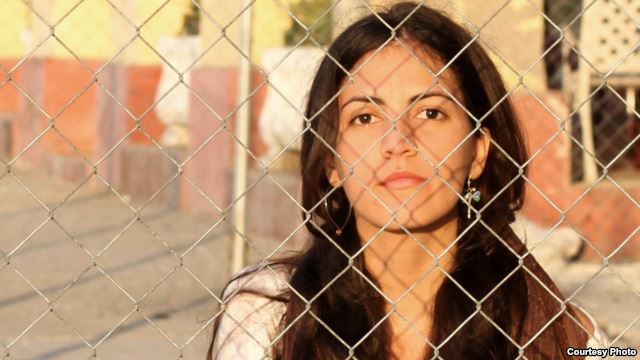
Tomorrow, at dawn, Rosa Maria Paya returns to Cuba, just as she promised at the Havana airport two months ago. Her word, contrary to what is common in Cuba, is honest.
Rosa Maria will return without bodyguards and without a media scandal, vulnerable and smiling, caressing her tireless cross, back to her already classic humble home on Penon street, near Manila Park, where her father Oswaldo Paya Sardinas (1952-2012) will never return, nor her good friend Harold Cepero Escalante (1980-2012). Both were leaders of the Christian Liberation Movement, both died on a tragic Sunday of last July, passed onto the hands of strangers and in a place in Cuba that is still uncertain, given that the official version has become unsustainable after all the evidence and testimonies exposed to the world by Rosa Maria Paya, without even having to raise her voice. Before the grotesque screaming of all forms of State Totalitarianism, the voice of a Cuban, an orphan of friendship and love.
Rosa Maria Paya will return to the land where the mortal remains of the martyred leaders of the Christian Liberation Movement rot. She will return alive and with a wish to resuscitate the sacred desires of living in truth in a socialist society, so panic-stricken and full of hypocrisy. Rosa returns and will sprout in Cuba without any accomplice disease of our octogenarian regime. She will return without any pretensions of violating travel laws or declaring herself on hunger strike. She returns inflamed with life and freedom. She returns, with an L (for ‘Liberty’), just like she left on a Friday this past February.
Cuban State Security did not care, at all, about her 24 years of age, grown into them with resistance in the face of horror. The Paya-Acevedo family is a family that still receives anonymous threats of “before the Revolution ends, we are going to kill you”. And, in effect, there is lots of that in the rheumatic rhetoric of the Revolution: anonymity, fear of having a face beyond Fidel and Raul (our Nuremburg trial will be in a minimal format).
Tomorrow morning Rosa Maria Paya will step out of media’s hands, out of the hands of f Human Rights organizations and parliaments, NGOs and democratic governments that have joined in solidarity. Because in Cuba, only bodies count, and the new face of the Christian Liberation Movement, without vocations of sacrifice, will return to a perverted nation which possibly may not let her travel again. It’s possible that we may never see her paused gesticulation, without the improbable arrogance of our caudillos. We may never again hear the vehement tenderness of her valor. In this sense, we should bid a soulful farewell to Rosa Maria Paya.
The main thing here lies, of course, not in her virtuoso image, but in the legacy of a work that is still powerful and possible in the citizen initiatives of the Varela Project, the Heredia Project, and the Path of the People, and many other concrete propositions which reduce the impunity of the Cuban government, as it forces it to comply with its own legality to transform itself according to popular will. An effort of dozens of thousands of citizens which continues to be ignored by our inoperative National Parliament, governmental organ which apparently prefers to opt for its own suicide instead of facing a future transition.
It is precisely this intimidating silence, that insulting impunity on the margin of morality, it is the malicious muteness of lies and death, that’s the welcome with which the authorities of Havana will now spy on Rosa Maria Paya. The Cuban State continues to be deaf, up to the point of insolence. Their operational logic is in no means institutional. Instead, it is like a secret sect.
Consequently, any abuse of power is expected against her and her family, both in and out of the island, now or in the survival of a decade in which they tortured her own father in her childhood eyes. Nothing is insignificant in that criminal boiler where the most ‘problematic’ activists of the Cuban opposition have been, are, and will be converted from bodies to corpse.
World, take a better look.
Rosa María Payá is alive today.
Translated by Raul Garcia, Jr.
15 April 2013
